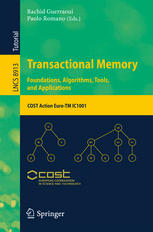

Most ebook files are in PDF format, so you can easily read them using various software such as Foxit Reader or directly on the Google Chrome browser.
Some ebook files are released by publishers in other formats such as .awz, .mobi, .epub, .fb2, etc. You may need to install specific software to read these formats on mobile/PC, such as Calibre.
Please read the tutorial at this link: https://ebookbell.com/faq
We offer FREE conversion to the popular formats you request; however, this may take some time. Therefore, right after payment, please email us, and we will try to provide the service as quickly as possible.
For some exceptional file formats or broken links (if any), please refrain from opening any disputes. Instead, email us first, and we will try to assist within a maximum of 6 hours.
EbookBell Team

0.0
0 reviewsThe advent of multi-core architectures and cloud-computing has brought parallel programming into the mainstream of software development. Unfortunately, writing scalable parallel programs using traditional lock-based synchronization primitives is well known to be a hard, time consuming and error-prone task, mastered by only a minority of specialized programmers. Building on the familiar abstraction of atomic transactions, Transactional Memory (TM) promises to free programmers from the complexity of conventional synchronization schemes, simplifying the development and verification of concurrent programs, enhancing code reliability, and boosting productivity. Over the last decade TM has been subject to intense research on a broad range of aspects including hardware and operating systems support, language integration, as well as algorithms and theoretical foundations. On the industrial side, the major players of the software and hardware markets have been up-front in the research and development of prototypal products providing support for TM systems. This has recently led to the introduction of hardware TM implementations on mainstream commercial microprocessors and to the integration of TM support for the world’s leading open source compiler. In such a vast inter-disciplinary domain, the Euro-TM COST Action (IC1001) has served as a catalyzer and a bridge for the various research communities looking at disparate, yet subtly interconnected, aspects of TM. This book emerged from the idea having Euro-TM experts compile recent results in the TM area in a single and consistent volume. Contributions have been carefully selected and revised to provide a broad coverage of several fundamental issues associated with the design and implementation of TM systems, including their theoretical underpinnings and algorithmic foundations, programming language integration and verification tools, hardware supports, distributed TM systems, self-tuning mechanisms, as well as lessons learnt from building complex TM-based applications.